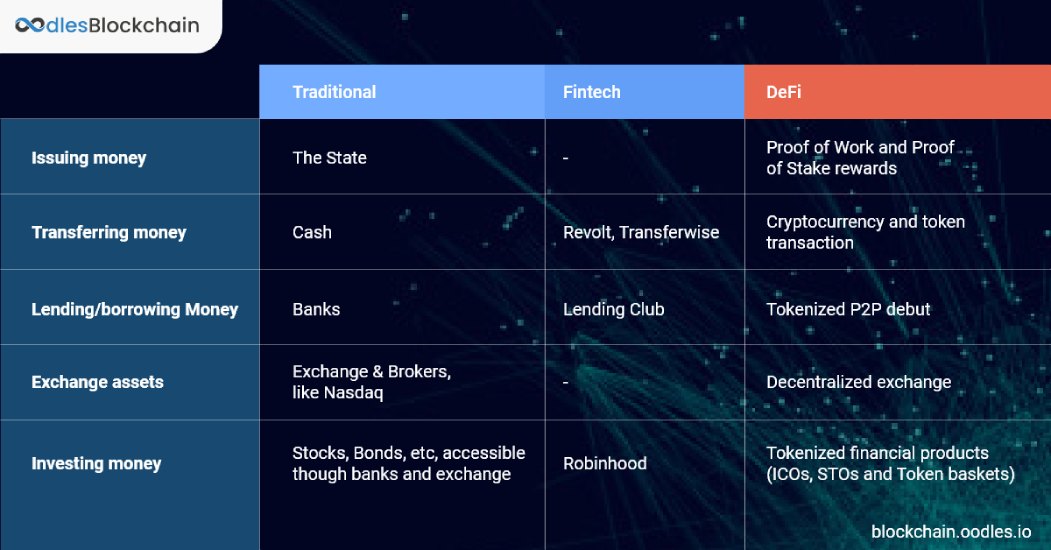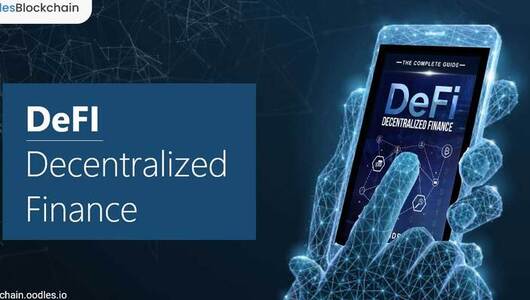-
Decentralized finance, which we also refer to as DeFi, associates with the transition of financial frameworks from centralized to decentralized. It basically enables blockchain’s distributed technology-powered frameworks to shifting existing centralized systems to peer-to-peer ecosystems. Therefore, the DeFi infrastructure enables opportunities as an expansive ecosystem comprising integrated protocols and financial instruments. Notably, they range from lending and borrowing platforms to stablecoins, tokenized crypto-tokens, and decentralized crypto exchange platform development.
DeFI (decentralized finance) has proved to be a success in the blockchain and crypto fintech development space. For instance, its range of real-world use cases for individuals, entrepreneurs, and businesses is more than $13 billion worth of value stored in smart contracts.
Traditional Vs Decentralized Finance
Although our conventional financial system works on a centralized platform controlled by central authorities, agencies, and intermediaries, decentralized finance operates as per a code running on a decentralized infrastructure powered by blockchain technology. Consequently, developers can develop efficient and secure custom financial protocols and platforms for the masses. They are open to anyone with an internet connection by installing immutable smart contracts solutions, majorly developed with Ethereum blockchain.

Markedly, one of the significant DeFi developments is that it has emerged as a replacement of fiat or real-world assets. Now, it enables crypto-assets to come into use in ways not imaginable. Entirely new technologies that can only operate on blockchains are decentralized exchanges, synthetic currencies, and flash loans. Concerning risk, confidence, and opportunity, this paradigm change in financial architecture offers a range of benefits.
Benefits of Decentralized Finance
Protocols and platforms in decentralized finance employ the most significant aspects of blockchain technology. Essentially, they ensure financial stability with accountability, liquidity, and an interconnected and standardized economic structure.
Customizable Financial Asset Development
Highly customizable and programmable smart contract solutions can automate deployment and enable the development of new financial instruments and digital assets.
Data Immutability
Blockchain provides tamper-proof coordination of data through the open architecture. It enables privacy and auditability with transparency.
Transparency Across the Network
Each transaction distribution and verification happens by users on the network on a public blockchain network. DeFi protocols running on a blockchain network carry open-source code available with restrictions for accessing, auditing, and expanding on for all.
Open for All
DeFi has the characteristics of providing cost-effective, permissionless access to services, contrary to conventional finance. Anybody can get access to DeFi applications with a cryptocurrency wallet and the internet. It enables access regardless of geographies and without requiring a significant amount of funds.
Ownership of Funds
Participants in a DeFi market have control over their funds while safeguarding their information across permissionless financial applications and protocols with Web3 wallets like MetaMask.
Also, Read | Blockchain-based DeFi | Understanding the Decentralized Financial Shift
The Role of Smart Contracts
Many of Decentralized Finance’s current and future implementations include the design and implementation of smart contracts. While the standard contract terms use legal language to describe the terms of the agreement between the contractual persons, machine code comes in use in a smart contract.
As the terms exist in machine code, smart contracts exclusively use computer code to execute contract terms. It enhances and automates various business manual procedures efficiently.
It is easier and safer to use smart contracts, which eliminates the risk for both parties. Smart contracts, on the other hand, add new kinds of threats as well. The value and sensitive knowledge locked in smart contracts are at stake since the machine code is vulnerable to glitches and vulnerabilities.
Also, Read | Making Your Business Smart with Blockchain Smart Contracts
DeFi Use Cases
Borrowing and Lending Platform Development
One of the most general types of software that are part of the DeFi ecosystem are lending protocols. Free, decentralized lending and borrowing have many benefits over the conventional form of credit. It includes quick payment of loans, the freedom to collateralize digital properties, no credit controls, and possible potential standardization.
Since these lending platforms run on distributed blockchains, the amount of trust needed reduces with cryptographic authentication methods. Blockchain lending markets minimize counterparty risk, make investing and lending easier, quicker, and more people have access to it.
Compound, an Investing and Lending dApp-Based on Blockchain Technology
It lets you lend and gain interest in your crypto tokens. Or, for instance, you require funds to cover your rent or purchase groceries. However, you have crypto savings locked up in your funds. It enables users to borrow against the deposit done in the Compound smart contract. Automatically, the Compound contract pairs creditors and lenders and automatically sets interest rates depending on supply and demand.
Also, Read | Blockchain P2P Lending Platform | Benefits, Features, and Processes
Services for Financial Banking
Because DeFi applications are financial applications by design, financial banking services are perfect use cases. They may include safe coins, mortgages, and insurance issuance.
There is an increased emphasis on the production of stablecoins as the blockchain industry matures. They are a sort of crypto-asset attached to a real-world commodity. Stakeholders can quickly transfer them digitally. Because cryptocurrency values can often fluctuate rapidly, stablecoins provide a means for digital cash for regular usage that, free of distribution and regulation by a central authority.
The method of obtaining a mortgage is costly and time-consuming, mainly due to the number of intermediaries who need to be involved. The implementation of a smart contract can ensure a significant reduction in costs associated with legal and underwriting processes.
Using blockchain for decentralized insurance solutions can eliminate or replace intermediaries while ensuring liability among multiple participants. It can result in lower prices for the same service level.
Also, Read | The Emergence of Stable Coins: An Alternative to Cryptocurrencies
MakerDAO
In this stablecoin project, each stablecoin is turned into the US Dollar while funding them with collateral using pegging. It ensures the programmability of cryptocurrency without volatility concerns. It is a drawback in cryptocurrencies like Bitcoin or Ethereum.
Nexus Mutual
Via using a risk-sharing pool, Nexus Mutual creates decentralized insurance on the Ethereum blockchain. While NXM tokens express the governance and membership rights, its members possess control over the pooling system. Initially, Nexus Mutual began with smart contract protection, enabling everyone to buy insurance on any Ethereum smart public contract. It means that consumers of DeFi have security from the lending of their funds to Compound or Dharma or their money invested in a Uniswap tank. Over time, Nexus Mutual may continue to grow into other blockchain-based and legacy insurance options outside of smart contract insurance.
Etherisc
Etherisc is a forum for decentralized insurance applications. Created by the core team, any shared infrastructure, policy models, and insurance license-as-a-service enable everyone to design their insurance products. With this, it offers a suite of simple insurance policies ranging from flight delay insurance and storm security to crypto wallet and collateral protection.
Conclusion
In synthetic properties, prediction markets, and wealth management systems, various DeFi (decentralized finance) implementations have emerged. The buzz can get you carried away, but when navigating this business, you need to take extra caution. Given DeFi’s tremendous ability, note that most of these protocols are at a very early stage. Connect with our experts for more information.

Our Offices
INDIA
Emaar Digital Greens, Sector 61,
Gurugram, Haryana
122011.
Welldone Tech Park,
Sector 48, Sohna road,
Gurugram, Haryana
122018.














